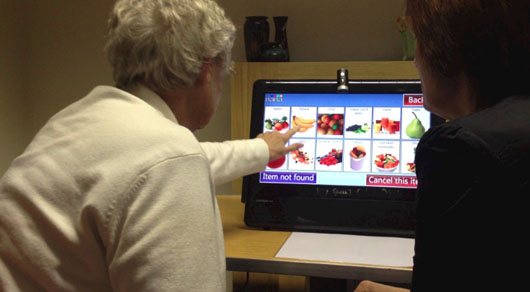Touch-screen technology to address malnutrition in older adults

A touch-screen computer to help detect malnutrition in older adults has been created by a team of researchers led by the University of St Andrews.
The NANA system, to be launched at an event at the Houses of Parliament in London tonight (Wednesday 7 November), will measure what older adults are eating at home to support research into malnutrition.
Sir Menzies Campbell, MP for North East Fife and Chancellor of the University of St Andrews will host the showcase reception at which University Principal Professor Louise Richardson will also speak.
Malnutrition is a major public health problem with an estimated cost of £13bn per year in the UK, but that is easily overlooked in our affluent and overweight society.
Whilst malnutrition affects all ages, older adults are particularly affected, with 1 in 3 who live independently considered to be at risk. 1.
However, spotting people at risk of malnutrition has been difficult as there was previously no easy way of tracking what people ate and drank in their own homes.
NANA (Novel Assessment of Nutrition and Ageing) is the result of a three-year project to develop a simple and easy to use system for measuring diet, cognition, mood and physical function.
It has been created by a team of academics from the Universities of St Andrews, Sheffield, Bath and Reading, together with input from 400 older adults across the UK.
As well as information about diet, NANA has measures of cognitive function, mood and physical activity, all of which play a role in nutrition.
Project lead, Dr Arlene Astell, Senior Lecturer in the School of Psychology and Neuroscience at the University of St Andrews said: “Being able to eat and drink properly is vital for keeping well and living a good life. We have worked with older adults to make NANA something that people would want to have in their homes and use every day.”
Tony Hill, a representative of the NDA (New Dynamics of Ageing) Older People’s reference group and member of the NANA Advisory Panel, said: “NANA is a very simple to use device that will dramatically reduce the number of people dying from malnutrition. I have really enjoyed being involved in the project and look forward to seeing people across the UK using NANA.”
Malnutrition is not confined to older people at home. Reports suggest that more than 50 per cent of hospital patients do not eat the full meal provided and up to 30 per cent of residents in nursing homes may not finish their lunch. 2.
Steve Wood, Managing Director of Sanctuary Care, and a partner in the NANA project, said: “For organisations such as Sanctuary Care who look after older people in their own homes, in extra care accommodation and in care homes, ensuring they eat well is a priority.
“NANA will be a vital tool for our staff to ensure the people we look after are able to enjoy the wide range of home-cooked nutritionally balanced meals we offer.”
The NANA touchscreen system will be showcased tonight (Wednesday 7 November), at a showcase reception at the Houses of Parliament hosted by Sir Menzies Campbell.
Sir Menzies has previously recognised malnutrition as a healthcare priority in our ageing population coupled with the need to take preventive action to reduce demands on overstretched health and social care services.
Other speakers at the event will include Professor Louise Richardson, Principal of the University of St Andrews, and Dr Arlene Astell, NANA project lead.
Guests at the reception will have the chance to try the NANA touchscreen system for themselves and receive a summary description of the project.
Note to Editors
Dr Arlene Astell is available on 07941418448.
The event will be held at 7pm tonight in the Jubilee Room in the Houses of Parliament at Westminster. Journalists are welcome to attend.
For image please contact the press office.
To organise interviews with Dr Faustina Hwang, University of Reading, please contact Pete Castle at the University of Reading press office on 0118 378 7391 or [email protected].
For interviews with Dr Liz Williams please contact Amy Pullan, Media Officer, University of Sheffield, 0114 222 9859, [email protected].
1. BAPEN 2011 survey.
2. “50% of hospital patients do not finish their meal”:
Hiesmayr M, Schindler K, Pernicka E, et al. Decreased food intake is a risk factor for mortality in hospitalised patients: the NutritionDay survey 2006. Clin Nutr 2009;28:484-91.
“Up to 30% of residents in nursing homes may not finish their lunch and fail to meet their nutritional requirement”:
Valentini L, Schindler K, Schlaffer R, et al. The first NutritionDay in nursing homes: participation may improve malnutrition awareness. Clin Nutr 2009;28:109-16.
Issued by the Press Office, University of St Andrews
Contact Fiona MacLeod on 01334 462108 / 0771 414 0559.
Ref: (NANA 07/11/12)
View the University’s latest news at http://www.st-andrews.ac.uk/news/
Category Research